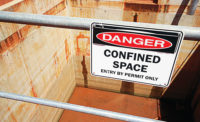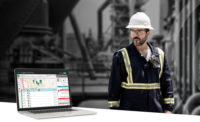With technology incorporated in nearly every aspect of our lives, you’ve probably wondered more than once whether someone was watching your every move.
Let’s get real for a moment: people are being monitored by technology every day. The question is, for what purpose? Before diving into conspiracy theories, let’s talk about a positive use for monitoring technology — saving lives.
A gas monitor that can alert you to hazardous conditions, record where and when you encounter gas hazards, communicate with nearby devices, and signal for help is not a bad thing. In fact, it’s quite the opposite. The untrusting sort may believe this data is being collected to be used against them — to track their whereabouts, determine whether the gas detector is turned on, and so on.
I want to focus on the most important point and the reason this connected safety technology exists: someone should have your back. In the military, we have the buddy system. I’ve heard the term “Brother’s Keeper” in some industries, and in others, it’s the two-man rule. No matter where you go, if the situation is dangerous, you shouldn’t be alone. So who can you count on to have your back in an emergency?
Wireless connection
Strong relationships are formed in the workplace when people spend years working side-by-side. We become close, like family. But far too often, those tight-knit relationships lead us to react emotionally in an emergency. Unfortunately, this is when a single injury or fatality on the job can become multiple casualties. When danger strikes close to home, sometimes our first reaction is based on emotion and instincts rather than what we’ve been trained to do.
What if you could know what happened to your friend before you entered the confined space? Peer-to-peer wireless connectivity could show you whether your friend was overcome by dangerous gases and you need to stay out and call for help, or whether a misstep caused him to fall and it’s safe for you to go in.
When alarm conditions are automatically shared, the entire team can make safer, faster, more informed decisions. Instead of guessing what to do or rushing to save your friend, you and your peers get the information you need to act fast. Whether a gas hazard, man-down, or panic situation causes an instrument to alarm, your whole team will instantly know who is in danger and why. This leads to better safety outcomes for you, your friend, your team, and the organization.
Value of early warnings
It can sometimes feel like technology constantly pushes us toward more connectivity — even when we might not need or want it. This is different.
The data collected by gas detectors is intended to identify hazards that could put you in harm’s way. If your gas detector alerted your safety manager to a recurring hazard within a confined space, and he could fix the process and make your workplace safer for everyone, isn’t that a good thing?
If you’re in trouble and press the panic button or you fall and the man-down alarm is activated on your instrument, wouldn’t you want someone to respond as quickly as possible? If the co-worker who happens to be your brother, the best man at your wedding, and the godfather to your child suddenly falls due to a high gas exposure, wouldn’t you want responders to know as much as possible about his environment so they could safely rescue him?
Management’s role
Management is responsible for ensuring that safety professionals have the tools they need to protect themselves. At the same time, workers need to trust and believe that leaders are looking out for their safety.
Taking action to address hazards and improve site safety is a quick way to earn that trust. Using the data that gas detectors are collecting to identify problems on your site shows workers that you’re committed to their safety. Help them understand how you’re using data to make the worksite safer for everyone.
Everyone has someone counting on him or her to make it home at the end of the day. Maybe it’s a spouse or parent, or maybe your children. For everyone to make it home to their families, someone needs to be watching your back — and you should feel better knowing they are.



